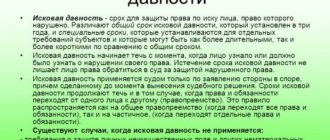Author
Sergey Ershov
Registration number in the register of lawyers of St. Petersburg – 78/5563
A few years after your father’s death, you learned that not all of his property was included in the inheritance. The real estate and cars he acquired in another marriage were registered in the name of his stepmother. You understand that you have been cheated, and you are even determined to resolve the issue in court. The problem is one thing - you don’t know what the statute of limitations is for inheritance.
I will tell you during what period the heirs can file a claim, which claims are subject to the statute of limitations and which are not. You will also find out in what cases it can be restored/extended and when the court has the right to refuse to consider an application due to missing a deadline.
Definition of the term
Expert opinion
Stanislav Evseev
Lawyer. Experience 12 years. Specialization: civil, family, inheritance law.
Inheritance means the property of a citizen at the time of death, which is subject to transfer to the heirs after his death. The inheritance also includes property rights and obligations (Article 1112 of the Civil Code of the Russian Federation).
Obligations that are inextricably linked with the personality of the deceased citizen are not an inheritance. For example, child support or compensation for damage caused to the health of another person or fines for traffic violations. Personal non-property rights are also not included in the inheritance.
Requirements for a will
The law imposes special requirements for making a will. If the form and (or) certification of the will is violated, it loses its legal force and cannot be used to inherit property.
The Civil Code provides for 4 types of wills:
- inheritance agreement or will (Part 1 of Article 1118 of the Civil Code of the Russian Federation);
- joint will of the spouses (Part 4 of Article 1118 of the Civil Code of the Russian Federation);
- closed will (Article 1126 of the Civil Code of the Russian Federation);
- a will in emergency circumstances (Article 1129 of the Civil Code of the Russian Federation).
Each of them has its own specific shape. But for most, the following requirements apply.
- The document must be certified by a notary or another person authorized by law. This requirement also applies to a will in an emergency, provided that the maker survives and the threat to his life has passed.
- The will must indicate the date and place of drawing up the document, information about the testator and heirs.
- Information about the inheritance must be available. You can transfer by inheritance not only existing real estate, rights, and other valuables, but also property that the testator intends to acquire in the future.
- The document is signed by the testator personally. If, due to objective reasons, he cannot sign the will with his own hand, a trusted person does this for him in the presence of witnesses.
Methods of inheritance
The legislator provided 2 grounds for inheritance:
- Acceptance of inheritance by law. Inheritance by law implies the participation of close relatives in the division of the property of the deceased citizen. Priority is given to spouse, children and parents. After them, the remaining relatives of the testator are called to inherit. If the property is the property of spouses, then the marital share is initially allocated. And only then did the division of property take place between family members. Everyone gets the same share. Its increase is possible due to the refusal of one of the relatives.
- Transfer of property rights by order. A will somewhat simplifies the inheritance procedure and allows the testator to independently determine the circle of beneficiaries. For example, a person can assign an apartment or car to a brother, friend or neighbor on the landing. If necessary, property is alienated in favor of a legal entity. However, the document is not absolute. It can be challenged in court. Also, the testator cannot deprive compulsory heirs of part of the property. This includes socially vulnerable people.
Also, dependents of a deceased citizen can participate in the division of property (Article 1148 of the Civil Code of the Russian Federation). These persons inherit property on an equal basis with the relatives of the testator.
Consequences of missing a deadline
A will is a transaction. It is subject to all the rules for civil transactions, including freedom of contract. The heir has the right to accept the inheritance or refuse it. Therefore, in order to obtain rights to property, a citizen must express his opinion regarding the property of the deceased.
Within six months, the heir must perform one of the following actions:
- submit an application for inheritance to a notary;
- ensure the safety of the property of the deceased;
- pay bills or debts for the testator;
- collect debts that were intended for the deceased;
- carry out repairs to inherited property.
If none of the listed actions is carried out within 6 months, then the period for accepting the inheritance is considered expired (Article 1154 of the Civil Code of the Russian Federation). Legal successors are called upon to inherit.
Is it possible to challenge an inheritance legally?
Heirs can go to court to protect their civil rights. The subject of the claim depends on the circumstances in which the applicant finds himself. The court's decision will depend on the presence/absence of evidence regarding the disputed issue.
Inheritance by law is based on family ties. Therefore, the law does not provide many reasons for challenging an inheritance.
In such a situation, the state of health of the deceased owner, his legal capacity, adulthood and other points important when registering an inheritance under a will do not play a role. Therefore, the initiator of the process must prepare irrefutable evidence of his point of view. Otherwise, the court will refuse to satisfy the claim.
Grounds for challenging a will
It should be taken into account that challenging a will is allowed only posthumously and cannot be done during the owner’s lifetime.
Conditions sufficient to challenge:
- There are violations that were committed during the execution of the will. These include mistakes made, information being entered that is located on top of the main text, and the requirements for notarization of the document are ignored;
- The deceased has been declared incompetent, as evidenced by medical information or witness testimony. It is required to prove that the deceased suffered from a disease that turned out to be an obstacle to expressing his real will;
- There were threats, deception or other manipulations that were directed at the deceased. Such actions are often committed by a beneficiary, or a person related to the property of the deceased;
- The will violated the legal rights of dependents, which extend to the allocation of a mandatory share. Even if the property of the deceased has already been distributed among the heirs, then they are the basis of the court decision, their shares will be revised in favor of the person recognized as disabled, whom the deceased supported;
- Actual and potential heirs doubt that the will is original. They believe that it could not have been drawn up by the deceased (see Article 1130 of the Civil Code of the Russian Federation).
Grounds for going to court
The law does not contain a complete list of grounds for starting legal proceedings. Everything is individual.
Reasons may include:
- deliberate concealment of information about the opening of an inheritance case;
- actual acceptance of property;
- restoration of missed deadlines for submitting documents;
- recognition of the heir as improper;
- recognition of a citizen as a dependent of the deceased.
Example. The owner of the apartment was an elderly woman. A son and daughter lived with her. Soon the son died. After a while, his mother also died. The direct heir was the daughter of the deceased woman. The documents were submitted to the notary on time. The woman entered into inheritance rights. However, the heiress hid information about the presence of a child with her late brother. The co-heiress was entitled to inheritance as part of her father's representation. After 3 years, the girl reached adulthood and went to court. The claims were satisfied.
When is it not necessary to restore the deadline?
Not all cases will require going to court. If other heirs have already registered ownership, and the successor really did not know about the death of the deceased, then he can agree with them on a voluntary redistribution of property.
Algorithm of actions:
- Contact the heirs who formalized the inheritance.
- Provide evidence that the court will restore the deadline for accepting the inheritance.
- Contact a notary together.
- Submit an application to be included in the list of heirs.
- Get new evidence.
On the one hand, the legal successors who registered the inheritance incur additional costs for re-registration of the property (at the State Traffic Safety Inspectorate, at Rosreestr). But if they go to court, they will be charged with paying the state fee and the plaintiff’s costs for a lawyer. But the property will still have to be re-registered. Therefore, if there is strong evidence that the missed deadline is valid, it is advisable for other heirs to agree to the redistribution of property on a voluntary basis.
Example. Katerina, Victor and Anton were supposed to inherit according to the will. But Katerina was on a business trip in another country, so she could not contact a notary in a timely manner. Victor and Anton registered ownership and divided the property. Returning to the country, Katerina turned to a notary. He sent her to court to restore her sentence. But the woman turned to Victor and Anton. She explained that when they go to court, all legal costs will be collected from them. Therefore, she offered to divide the property voluntarily. The men turned to the notary with an application to include Katerina among the heirs. The notary canceled the issued certificates of inheritance rights and issued new ones for 3 heirs.
Time limits for challenging inheritance
The law has such a concept as a statute of limitations. It is 3 years (Article 196 of the Civil Code of the Russian Federation).
Although you can file a claim after 5 years . The court cannot refuse to accept a claim because the statute of limitations has passed.
The rule of law is applied only upon the application of the participants in the trial. The countdown begins from the moment a person becomes aware of a violation of his rights.
a lot can change in 3 years Therefore, it is better to go to court at the stage of registration of inheritance.
If the heir needs to restore the deadline for submitting documents to the notary, then different deadlines apply. The application must be submitted within 6 months after the reason for absence ceases. For example, if a citizen was abroad and returned on April 10, then the claim must be filed before October 10 of the same year. Otherwise, the court will reject the claim due to missed deadlines.
What nuances to pay attention to when determining the limitation period?
The statute of limitations for inheritance legal relations begins to run after the opening of the inheritance, i.e. they are counted unambiguously after the death of the testator. If the plaintiff learned about the violation of his rights not on the day the inheritance was opened, but later, the countdown begins from that moment.
But when determining the beginning of the flow, there are still a lot of nuances. I’ll tell you about them further.
From what moment is the term calculated for violation of the rights of minors and incompetents?
The beginning of its course is the day when I learned (should have known) about the violation of the rights of a minor or incapacitated heir and about the proper defendant in the claim:
- His legal representative.
- Conscientious representative - in case the legal representative improperly performed his powers.
- The heir himself - subject to the emergence or restoration of full legal capacity.
On a note. The Supreme Court of the Russian Federation concluded: “A child, due to his age, cannot understand the importance of the requirements established by law, and the inaction of his mother/father/guardian should not affect the interests of the minor.”
How to determine the statute of limitations for challenging a will
To challenge the will, you have only 1 year.
To challenge/invalidate the will, from the moment it was announced or from the day the plaintiff learned (should have known) about the circumstances for invalidating the transaction, the following deadlines apply:
- For voidable wills, i.e. committed under the influence of delusion, deception, violence, threat and if the competent testator did not understand the significance of his actions and could not direct them - 1 year.
- For claims related to the consequences of recognizing a contested will as invalid, incl. return of everything received - 1 year.
- For void wills made in violation of the requirements of the Civil Code of the Russian Federation regarding the identity of the testator, the procedure for drawing up, the form, content, and certification - 3 years.
- For claims related to the consequences of declaring a void will invalid, incl. distribution of the testator's property among the heirs according to the law - 3 years.
Related articles:
How to challenge a will in 2021 - step-by-step instructions
What you need to know about the limitation period for real estate inherited by law and by will
For inheritance disputes, the subject of which is real estate (land plots, houses, apartments, dachas, buildings and structures), the general limitation period is most often applied - 3 years. For good reasons, this period can be extended, but it is unacceptable to exceed 10 years from the date of violation of the right.
For real estate, all the rules set out in the previous sections for calculating and applying the limitation period apply. Also pay attention to some nuances:
- Its course does not depend on the basis of inheritance, i.e. it does not matter whether the property has passed or should pass to you by law or by will.
- It depends on the requirements stated in the claim - a general period of 3 years or a special one can be applied (for example, for declaring a contested will invalid - 1 year).
- Does not apply to the requirements listed in Art. 208 of the Civil Code of the Russian Federation, incl. to a statement of claim by the owner or other holder of real estate to eliminate any violations of his rights.
- There is no statute of limitations if the claim is not related to deprivation of possession of real estate, but only a registered right is disputed.
- For claims for recognition of ownership rights aimed at ensuring that the right arose for the first time for the plaintiff (i.e., the plaintiff is not the owner of the property), a general period of 3 years applies.
- It is applied by the court only upon the application of a party to the dispute.
What is the statute of limitations for claims for division of property and allotment of shares?
If the heirs fail to reach an agreement on the method and conditions for dividing the common property or allocating a share to them, they have the right to go to court. The limitation period applies only if the rights of the heir are violated or if there are obstacles to their implementation.
Thus, statute of limitations does not apply to demands for the allocation of a share - inheritance rights have already been realized, and the impossibility of allocating a share due to a missed deadline would mean a limitation of the rights of the owners.
If, as a result of the division, one of the heirs received more property than the size of their allotted share, the discrepancy is eliminated not by reviewing the share in court, but by compensation.
On a note. When dividing inherited property, the heir can use his preemptive right to indivisible things, household furnishings and household items. But this should be done within 3 years from the date of opening of the inheritance, since later he will be deprived of this right.
If the dispute concerns illegally hidden or not included in the estate, the general period is 3 years from the day the plaintiff learned about the violation of the right and about the defendant in the case.
What is the deadline for allocating the marital share through the court?
The statute of limitations does not apply to cases involving the allocation of a marital share in property jointly acquired with the testator and the recognition of ownership of this share by the surviving spouse. This requirement relates to requirements to eliminate violations of rights not related to deprivation of possession under Art. 208 Civil Code of the Russian Federation.
On a note. The joint ownership regime applies to all property acquired during marriage, even if it was registered in the name of one of the spouses or if one of the spouses did not have their own income for good reasons (for example, running a household).
If the marriage was dissolved and after the divorce the property was not divided, then the general limitation period of 3 years applies to claims for the division of common property. The starting point will not be the date of termination of the marriage relationship, but the day when the surviving spouse learned (should have) learned about the violation of his right.
What is the limitation period for collecting debts of the testator from his heirs?
To submit a claim for debt collection, 3 years are allotted from the date of delay.
This period is calculated according to the general rule and is 3 years not from the date of death of the testator, but from the moment the delay occurred. It is not subject to interruption, suspension or restoration - Art. 1175 of the Civil Code of the Russian Federation.
The arrears of alimony and payment of penalties arising due to the fault of the testator are transferred to the successor who accepted the inheritance, within the value of the inherited property transferred to him - clause 10 of the Review of Judicial Practice of the Supreme Court of the Russian Federation No. 4. The limitation period is calculated separately for each overdue monthly payment.
Important! If you, being an heir and acting as a defendant in the case of collecting the debts of the testator, do not declare in court that the statute of limitations has expired, the court is obliged to consider the claim, and most likely you will have to pay for the inherited obligations.
The limitation period does not apply to claims against heirs for compensation for damage caused by the testator to the life or health of another person, as well as for moral damage caused.
How to challenge an inheritance legally in court
The heir can protect his rights in court. The documents are sent to the district court.
The claim is filed:
- in the general procedure - to the court at the place of residence of the defendant;
- Disputes regarding a property are considered at the location of the house or apartment.
- if the heir needs to establish a legal fact, then the application can be submitted at the place of his registration.
Procedure of the judicial authority:
- After a preliminary consideration of the claim, the court sets a hearing date.
- Sends out agendas to participants in the process.
- Based on the results of the proceedings, the appropriate decision is announced.
- If the plaintiff was able to prove his position, then the court satisfies his demands.
- If the heir fails to provide compelling evidence of his innocence, then the application remains unsatisfied.
- The court decision comes into force one month after its adoption.
- Participants in the process are given time to appeal the procedural document.
Order and procedure
Procedure for the heir:
- Preparation of documents.
- Filing a claim.
- Participation in legal proceedings.
- Providing evidence, justifying your position.
- Obtaining a court decision.
- Visiting a notary to register an inheritance.
When preparing documents, do not forget about the statute of limitations. Otherwise, the defendant can use this fact against the plaintiff. If deadlines are missed, then you need to prepare to provide compelling arguments on this matter.
Statement of claim
The form of the statement of claim is fixed by law. If a document does not comply with the requirements of the Code of Civil Procedure of the Russian Federation, then the court may leave it without movement.
Contents of the claim
| No. | Paragraph | A comment |
| 1 | Name of the district court where the case will be heard | Indicate full name, postal address |
| 2 | Information about the plaintiff, defendant, third parties | Full name, registration address, passport details, contract phone number, email address |
| 3 | Description of the circumstances that led to the violation of civil rights | The content of the statement of claim depends on the circumstances of the particular case. If a person is seriously ill and needs to restore the deadline for filing an application for acceptance of an inheritance, then the stated facts must be described in the claim. If there is another reason for initiating the process, it is also necessary to state it in detail. |
| 4 | Evidence of the stated facts | If a citizen missed the deadline due to treatment, then evidence of completing the course of treatment (extract from the medical record, medical report, sick leave) must be attached to the application. If the heir is found unworthy, a court verdict and witness testimony will be required. |
| 5 | The plaintiff's final request | Restore the deadline for entering into inheritance, recognize the heir as unworthy |
| 6 | Cost of property claim | If the claim is of a property nature (division of inheritance), then it is necessary to indicate the value of the disputed property |
| 7 | List of attached documents | Indicate the name of the documents and the number of copies |
| 8 | Date of application | |
| 9 | Signature of the plaintiff or his representative | The heir himself or his official representative has the right to sign. The authority of the representative must be confirmed by a notarized power of attorney. |
Sample statement of claim for declaring an heir unworthy
Required documents
Regardless of the subject of the dispute, the plaintiff must attach to the claim documents confirming the facts stated in it. Otherwise, you should not count on a positive result. The court's decision cannot be based on assumptions.
The basic package of documents includes:
- applicant's passport;
- evidence of the death of the testator;
- document confirming the right of inheritance;
- papers indicating relationship with the deceased subject;
- documents confirming the plaintiff’s position;
- proof of payment of state duty.
If the application is submitted by a representative of the plaintiff, then a power of attorney issued in his name will also be required. The claim is filed according to the number of participants in the trial. Copies of the application are attached to the claim along with other documents.
Expenses
When filing a claim, you must pay a state fee. The amount of the fee depends on the subject of the dispute.
For consideration of cases within the framework of special proceedings, 300 rubles . Property disputes are paid based on the cost of the claim (Article 333.19 of the Tax Code of the Russian Federation).
Deadlines
The period for consideration of a civil case is 2 months (Article 154 of the Code of Civil Procedure of the Russian Federation). However, in reality, court hearings can take years.
There are many factors taken into account here:
- number of participants;
- remoteness of the region of residence of the plaintiff or defendant;
- participation in other legal proceedings;
- presence of representatives;
- judge's leave;
- illness of a party to the case;
- calling witnesses;
- carrying out examinations, etc.
How to calculate the limitation period
The calculation and application of the limitation period in inheritance disputes is one of the complex legal aspects. And the day of opening of the inheritance (the day of death of the testator, recorded in the death certificate or in the court decision declaring him dead) is not always the beginning of this period. Therefore, I will try to “sort everything out.”
From what moment does the countdown begin?
In disputes about inheritance, the beginning of the term is considered to be the day when the heir meets under the combination of the following conditions - clause 1 of Art. 200 Civil Code of the Russian Federation:
- Learned or should have learned about a violation of your rights.
- I also found out who is the proper defendant in the lawsuit to protect this right.
When determining this day, the following nuances should be taken into account:
- If the plaintiff learned about the violation of his right not on the day of its violation, but at a later moment, he must prove this circumstance. The fact that a person has already learned about a violation of his rights may be evidenced by documents or testimony of witnesses.
- The expression “should have known” means that there is no direct evidence that the plaintiff knew, but under certain circumstances it simply could not have been otherwise.
- The proper defendant is the person who violated the rights of the plaintiff or is a participant in the disputed legal relationship. Such persons may be other citizens, other heirs, a notary, the state represented by a local government body, the Federal Property Management Agency or the tax authority.
- Courts considering disputes arising from inheritance legal relations usually rule that the plaintiff himself must take measures to clarify the issue of the proper defendant.
- If the defendant turns out to be improper, the court may allow his replacement to be proper. Only after such a replacement, preparation and consideration of the case are carried out from the very beginning.
- The plaintiff has the right to declare disagreement with replacing the improper defendant with another person. Here the court must consider the case based on the claim.
What are the rules for calculation?
These rules are as follows - Ch. 11 Civil Code of the Russian Federation:
- The countdown starts from the next day after the occurrence of the event that determines the beginning of the period.
- If the term is calculated in years, then it expires on the corresponding month and date of the last year of the term.
- If the last day of the term falls on a holiday/non-working day, the end date will be the nearest working day.
- The period ends from the date of application to the court for protection of the violated right. Such a day is the day of filing a statement of claim in court (including on the Internet) or its acceptance by a postal organization.
- The flow is suspended when a state of emergency occurs, the plaintiff is in the armed forces under martial law and other circumstances - Art. 202 of the Civil Code of the Russian Federation.
How does the statute of limitations apply?
The expiration of the time limit is a basis for refusing a claim, but only if the defendant declares this.
The heirs have the right to go to court even if the statute of limitations has long expired. In such a situation, the rules apply - Art. 199 Civil Code of the Russian Federation:
- The court is obliged to accept the application regardless of the expiration of the deadline.
- The court can apply the limitation period only upon the application of a party to the dispute.
- Statements by third parties (the wrong party) about expiration are not grounds for dismissal of the claim.
- The expiration of the limitation period at the request of the other party is an independent basis for refusal of the claim. Those. the court does not need to examine other circumstances of the dispute.
Is it possible to restore the term by inheritance?
General and special terms can be restored in exceptional cases - for objective, valid reasons. The burden of proving their validity rests with the person bringing the claim.
Circumstances related to the personality of the person applying for the restoration of the term of the heir are considered valid - Art. 205 Civil Code of the Russian Federation:
- Serious illness.
- Helpless state.
- Illiteracy.
- Others - the list is open.
Important! The reasons for omission must have occurred within the last 6 months of the statute of limitations. The limitation period of 10 years is the limit and cannot be restored, but the rule applies provided that the other party to the dispute has declared its expiration.
Arbitrage practice
To win a case in court, the heir will need strong arguments. It is necessary to consistently state the essence of the problem and provide evidence of the stated facts. Typically, probate hearings occur with the participation of an experienced lawyer.
Example. The plaintiff went to court. He asked to invalidate the certificate issued by the Administration of the village council. The plaintiff also insisted on invalidating the certificate of inheritance that was issued to the defendants and recognizing his ownership rights. The essence of the requirements is that the defendants entered into inheritance rights by way of presentation to the house and land. The basis for processing the documents was a certificate from the Administration. The document confirmed the actual acceptance of the inheritance. However, it was originally issued for a different purpose - receiving compensation for a cash deposit in a bank. The defendants did not admit the claim. The notary also objected to the claims. The claim was partially satisfied. The certificate of actual acceptance of the inheritance by one and the defendants was declared invalid. The inheritance certificate issued to the specified person was also declared invalid. The right of common shared ownership of the house and plot of land was recognized for the plaintiff (Decision of the Barysh City Court of the Ulyanovsk Region dated May 4, 2012, case No. 2-154/2012).
Deadlines in inheritance law
To determine the period of entry into inheritance, it is necessary to distinguish between the following concepts:
- Deadline for entering into inheritance. The period during which the main recipients must claim their rights.
- The emergence of the right to inheritance as a result of the refusal of heirs under a will or a previous order. Transfer of rights to the next line of recipients.
- The period by which the inheritance procedure is shifted in time in the presence of special situations. Determined by a decree of a notary in the event that the heirs have gone to court or there is information about the unborn heir.
- Limitation periods for protecting the rights of an heir. The period during which the successor may apply to the court. Varies depending on the reasons for the violation of rights.









